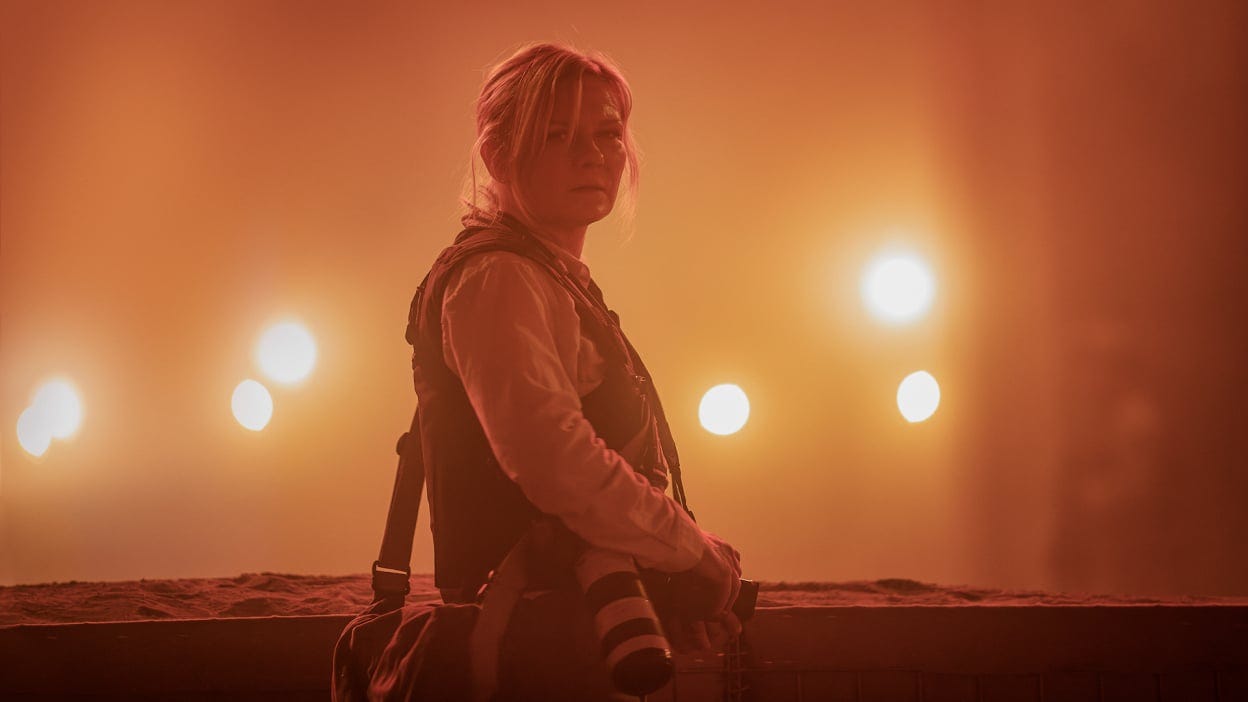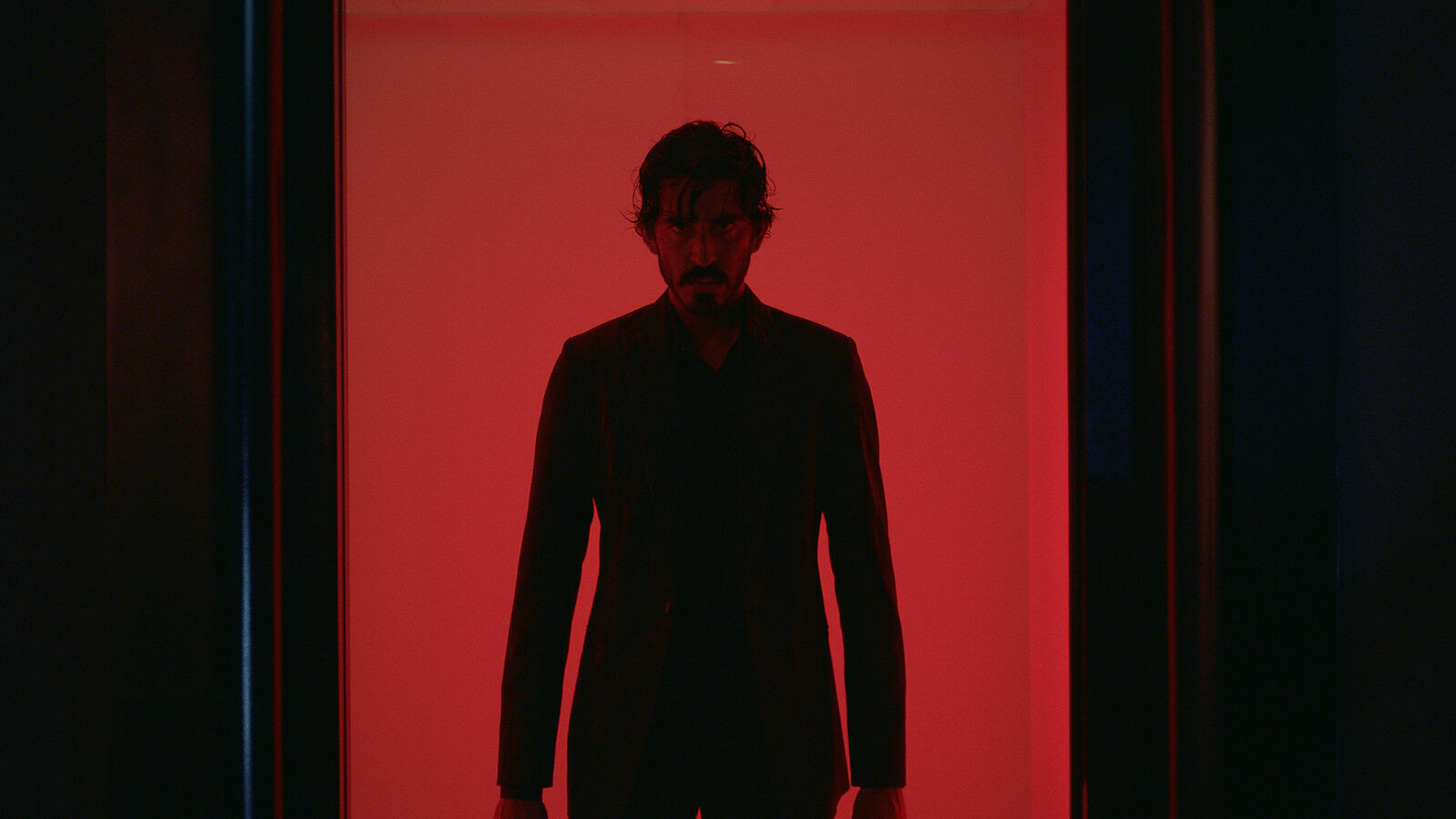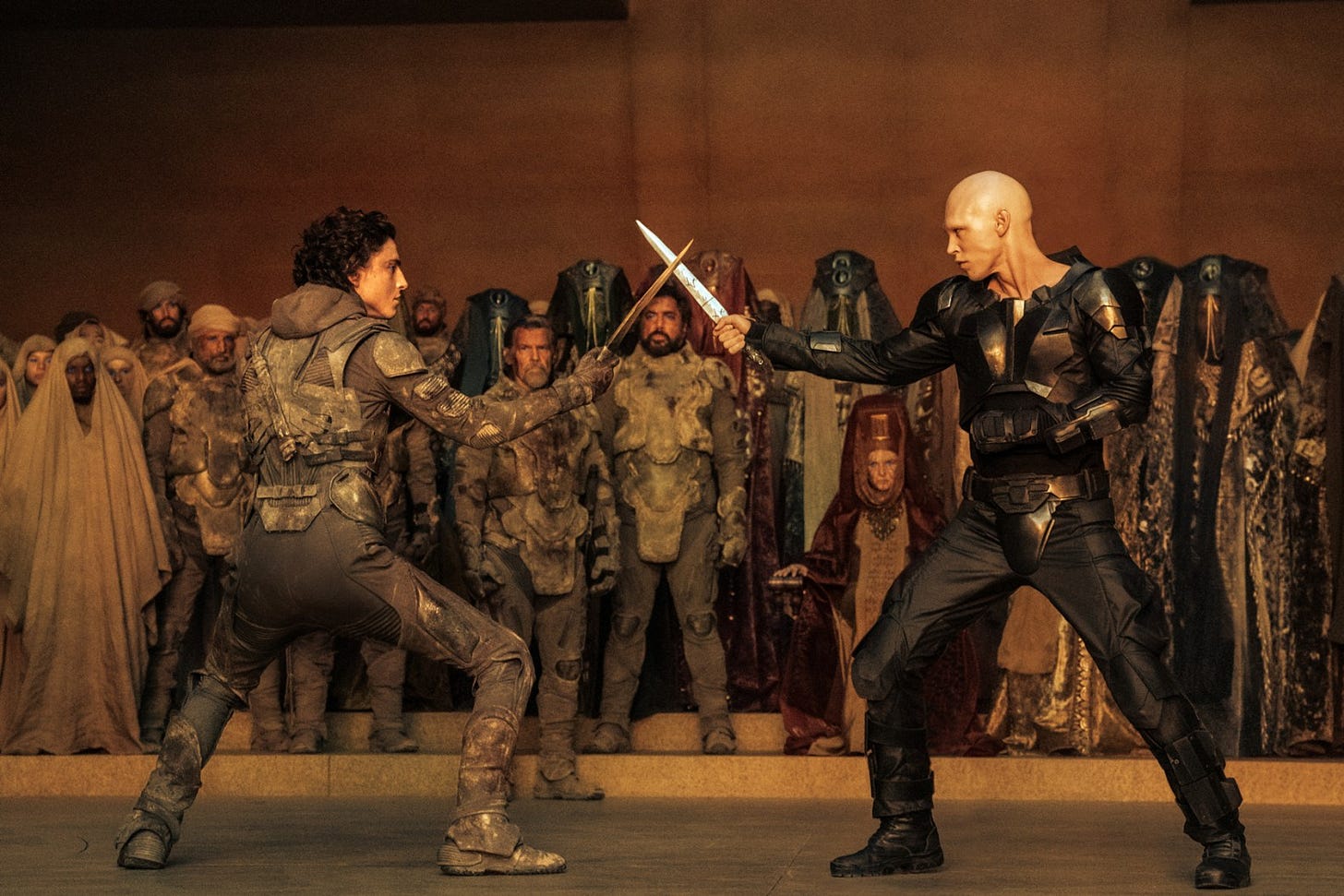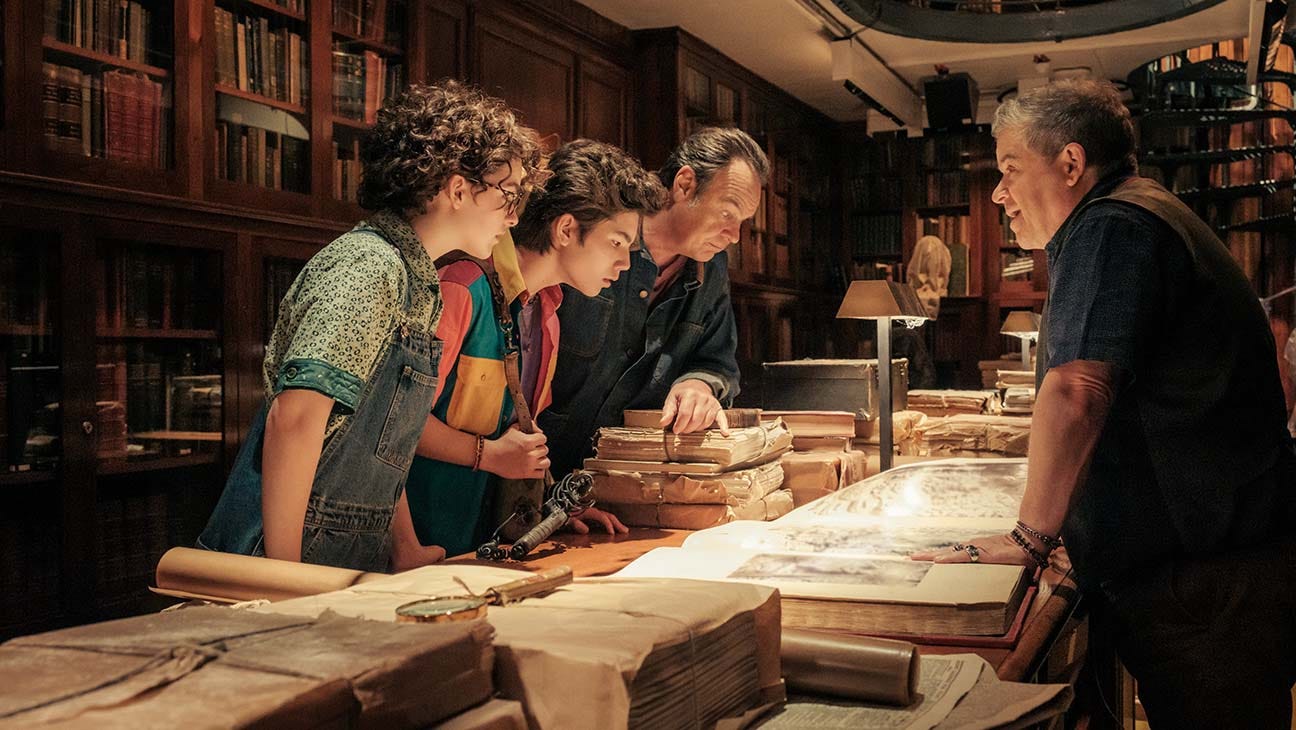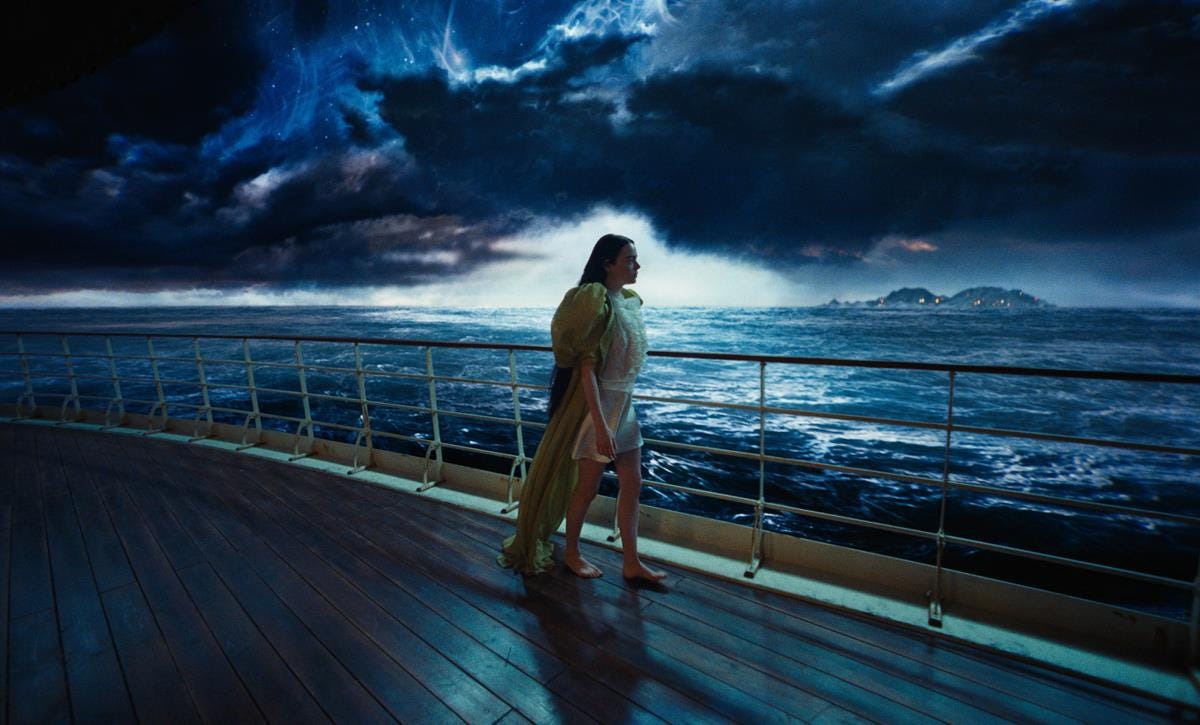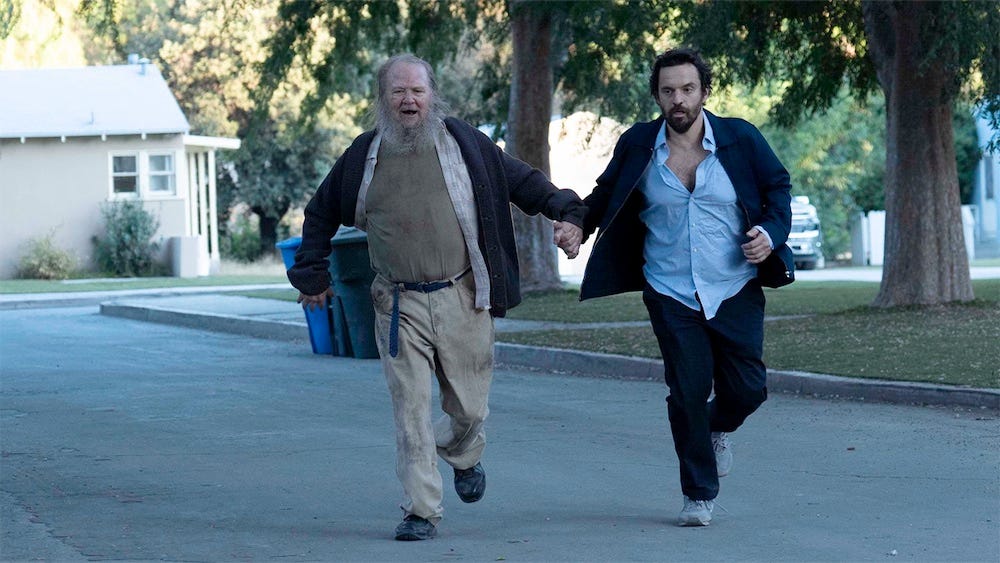Civil War, Monkey Man, and more 2024 new releases, reviewed
2 lengthy reviews and a bunch of quick reviews for 2024 films that I haven't reviewed yet
Civil War
Alex Garland’s hotly anticipated return to the big screen is a stylistic departure for both him and A24. One of the most interesting filmmakers currently working, he burst onto the scene with Ex Machina and Annihilation, two excellent sci-fi features with a level of confidence rarely found in new directors, most likely acquired from his years of experience writing other beloved films like 28 Days Later and Dredd. Though Men wasn’t quite as strong of an effort, Garland’s penchant for stunning visuals and thought-provoking themes cultivated a fittingly unnerving atmosphere (his only real misstep in his career thus far was his FX miniseries Devs). Civil War is his grandest and most ambitious feature yet; returning to A24, it also breaks the indie studio’s mold by providing Garland with a big budget and the opportunity for large-scale storytelling. Because of this freedom, Civil War expertly transports the audience into a dystopian hellscape of America and immerses the audience into this survival scenario. Blending the country’s iconic imagery with desolate set design, Garland cultivates a dangerous environment that puts the audience on edge during every scene. The pulse-pounding visuals know exactly when to show images of extreme violence, when to cut away and leave viewers to imagine, or when to fully indulge in the scenery and create these gorgeous visuals.
Likewise, the sound design is incredibly effective. Not only is it staggeringly loud in some instances, but the gunshots and explosions are mixed in a way that robs them of their “cool” factor and instead emulates the horrific sounds of war. Your heart skips a beat whenever you hear these noises, and whenever they aren’t heard, you sit in dread of when you will hear them next. The best example of this, and has since become the most talked about scene of the year, was the Jesse Plemons scene that will certainly linger as one of the most hauntingly memorable sequences of the year. It’s this movie’s equivalent to the bear scene in Annihilation, both in the nerve-shredding intensity and that it exemplifies the most terrifying aspects of this setting. Much has been made about the film’s politics, which went from initial worriment about which side it will take to a mixed reaction of frustration and relief that it’s incredibly apolitical. I appreciate that Garland didn’t want the film’s message to be drowned out by taking political sides, as that would be the one aspect that audiences would inevitably latch onto most, and the simplistic mission statement is bluntly effective when up against this warped mirror up to modern America.
However, this decision also has consequences. There is a serious lack of world-building here, as Garland makes no effort to explain how this war escalated or any details about how this reality came to be. He didn't need to take a hard political stance, but the even-keeled approach he took here means that the commentary was somewhat surface-level and the stakes of the war were never fully fleshed out. This not only chokes some of the more ambitious statements out of the script; plenty of haunting, too-close-to-home moments remain (such as the Plemons scene or another involving a soldier discussing his unknown “enemy”), but they can’t tie together into something deeper. Likewise, the film makes a hard third-act shift into action movie territory, leaving behind the deliberately leisured examination of this landscape into a focus on explosive set pieces. The scale is impressive, but it’s a jarring tonal shift that also brings about some smaller problems (it falls into a number of cliches, there are some significant logic gaps, and it implements a number of bizarre music cues).
The characters here are all fine, mostly because of the strong cast adding a bit more personality to them. However, they are far too thinly sketched to cover up for the lack of meaningful messaging I previously discussed; they are serviceable when operating as faces examining this dystopian scenario, but when the film’s latter half becomes more reliant on their arcs, the film falters. Even the film’s logic falls into this trap; much ado has been made about the alliance between Texas and California and the other details that would never apply to America as we know it. This is clearly Garland’s way of not alienating anyone and making sure that no political side bears the brunt of the criticism here. However, I also can’t shake the feeling that Garland is trying to have his cake and eat it too, both by claiming that this film is a reflection of modern America and taking many practical liberties to ensure that it isn’t an exact reflection of modern America. I understand that Garland doesn't want to overstep here and go too hard in this commentary (that was the trap that a film like Don’t Look Up fell into; attempting to satirize a situation that was already a caricature of America was just fighting a losing battle).
Just so all of my readers are clear, I really liked Civil War. Garland’s expertise mixed with an inherently compelling premise was always going to be interesting at the least, and in this execution, he delivers on an exciting, scary film that is superb in regards to its technical aspects. Coming from Garland and A24, I just can’t help that they should have aimed for something a bit more provocative and thoughtful than what we received. He didn’t need to take a firm political stance, but when taking such a big swing here, it feels odd that he’s pulling his punches in favor of broad appeal. As a dystopian war film, it delivers. As a canvas of modern America, it aims at targets that are simply too broad to allow it to fully satisfy.
Grade: B+
Monkey Man
On the exact opposite spectrum of Civil War, we arrive at a film that pulls absolutely no punches. Dev Patel, in his directorial debut, immediately decided to put a stamp on the action genre with this ferocious experience that attempts to do a hell of a lot all at once, and it largely succeeds at all of it. Aside from being a straightforward revenge film, Patel also aims to interweave Indian culture, intrigue, and an arc for Patel’s character that sees many stages of defeat and recovery. Similarly, he implements themes about corrupt leaders, the broken systems that enable them, corruption in India’s caste system, the struggles of the underclass, and India’s treatment of trans women. For his directorial debut, Patel certainly did not spare himself the effort, and it’s a testament to his abilities behind the camera that he manages to interweave all of these while only feeling occasionally overstuffed. I appreciated that Patel managed to elevate a simple premise with deeper themes that examine India’s society in a manner rarely seen in Hollywood. Not only does the examination of these corrupt figures ring true to modern-day India, but they provide a more layered and satisfying motivation for our hero’s revenge quest.
Because the trailer includes many images of Patel rampaging through high-end nightclubs in a suit, many immediately dubbed the film “Indian John Wick”. This comparison is very superficial, as not only are the plots of the two films completely different, but they vary in their action styles. Monkey Man takes a brutal, raw approach to its fight scenes, not afraid of sparing any brutality to make the action as effective as possible. Because Patel is frequently outmatched in these fights, he must resort to any violent tactics possible (without spoiling anything, there are at least four different ways Patel kills people with his teeth in this film), which both adds a sense of desperation and eventual victory to the character’s conflicts. Much of the action is extremely memorable, but a few too many moments are plagued with an over-reliance on shaky-cam that can distract from the choreography (one way the film does draw comparisons to John Wick is how It utilizes sleek lighting, which certainly adds some punchy style). Patel’s brooding performance cements himself as the badass-in-chief, but his acting ability is put to good use by displaying much of his vulnerability.
Now, there are certainly faults to Patel’s ambition. As admirable as it is, the film can occasionally be spread thin with how much it attempts to do. Characters who are important to the first act disappear and aren’t seen again, and the film can feel like it’s often trying to set up too much at once. This is most evident during the second act, where the film has to do some major reshuffling after the first major action sequence by introducing a new setting and new plot strands to go with it. After the high-octane action that preceeded it, the pace can sag a little in their attempts to introduce so much. Still, I appreciate the storytelling’s rhythmic balance between providing the action movie goods and pausing to add weight to the carnage. It’s been a while since I’ve seen a revenge film that is this reflective without compromising its action, and doing all of it in style while infusing Indian culture. With so much on the plate here, I imagine that this will benefit from rewatches and will linger as one of the modern standouts in a very crowded genre. In his directorial debut, Patel has proven that he is not only capable as a filmmaker, but that he has a lot of interesting things on his mind and he can say them with flair. If Monkey Man is any indication, I can’t wait to see what else he has to say.
Grade: A-
Quick Reviews
Abigail
Directing duo Radio Silence seems to have cornered the market on making fun, bloody horror movies, and Abigail is just another example of that. They take a very fun premise, contain it to an isolated setting, and let the chaos run wild with plenty of fun to be had. It’s fast-paced, twisty, bloody, funny, and balances out its silly, tongue-in-cheek tone with moments of suspense. Radio Silence has once again proven that they’re one of the few directors (well, pair of directors) who can really nail the horror-comedy. The cast here is all enjoyable, but Melissa Barrera walks away with another memorable leading role and Alisha Weir nails her part as a charming, scary, and highly energetic performance. It struggles a bit when trying to stick the landing in the final fifteen minutes, and the inherently limited ambition of the story would never let this movie rise above simply being a fun genre flick. I also wish that the marketing could have hidden a few more of the secrets here, as it would have made the experience even more surprising, but knowing the state of horror movie marketing, that’s probably just wishful thinking on my part. If you know what you’re getting into here, you should walk away plenty satisfied with Abigail.
Grade: B
Dune: Part Two
Hoo boy, here we go. Much ado has been made about this film, and as a Denis Villeneuve fan who wasn’t a big fan of the first Dune, I can say I liked this one marginally more while still acknowledging that this franchise just isn’t for me. Dune: Part Two is undoubtedly a spectacle of epic, and epically hollow, proportions. This one was slightly more appealing for me, if only because the visuals, set design, and sound design radiated even more in a theater. The last 20 minutes and the sandworm scene were definitely the highlights, but I’d be lying if I said I was invested in much of this film or that it moved me in any significant way. The storytelling, tone and characters are all too distant, too mythological, too detached from the gigantic scale that threatens to swallow everything else whole. It’s great that I seem to be in the minority here and everyone else is loving it, but the scope of these films are so huge that it’s tough for me to connect with anything beyond it, and I found my eyes frequently glazing over during the second act. All I will say is that I’m really hoping that Denis doesn’t pigeonhole himself into the same corner that James Cameron has, because I would really like to see him move on from this franchise soon and get back to telling original stories.
Grade: B
Ghostbusters: Frozen Empire
As someone who has no nostalgia for the original Ghostbusters, yet very much enjoyed Ghostbusters: Afterlife, Ghostbusters: Frozen Empire was a huge step down that basically represented everything I hate about modern-day blockbuster filmmaking. $100 million thrown at a half-baked script that thinks heaps of CGI can cover up basic storytelling flaws? Check. Groan-inducing, sub-Marvel humor that lacks any of the SNL-style edge that this franchise was born from? Check. Soulless nostalgia-baiting? Check. Completely cluttered storytelling and an overstuffed cast that only exists to dust off and proudly display every remaining corner of this rotting IP? Check. A complete lack of directorial vision, as if this film was entirely run by out-of-touch studio executives who will not rest until every movie property you loved from the ‘80s is beaten into the ground? Check. So, in other words, it’s a Sony movie. At least this one had Kumail Nanjiani giving a little bit of life to everything. As for everything else, a hard pass.
Grade: C-
Poor Things
I’m pretty disappointed to say that, for all of its creative merit, Poor Things did not do it for me. Everything about the imagery here is immaculate, with the cinematography, production design, sets, costumes, and special effects all working in personal synchronization. The beauty of the visuals (particularly the usage of tricks like fish-eye lens and shallow depth of field to switch up the perspectives) really kept me engrossed when the story lost me. Yorgos Lanthimos is clearly passionate about this utterly demented tale and finely crafts every detail of this movie to execute his vision. Everyone in this cast is working overtime to make themselves memorable in a movie where nothing can be forgettable, there are moments where it’s genuinely funny in all of its shocking boldness, and it’s so breathtakingly raunchy it makes Saltburn look like a Pixar film.
However, Yorgos might have stretched himself a bit too far here. He wanted to both explore the sexual exploitation of women and their sexuality at a young age as well as Bella’s sexual liberation and how women use their bodies to come into their own identity. That left a lot of the messaging contradictory for me and ultimately left many of the different ideas touched on not explored to their full potential. all of it still felt like a gimmick to me. Once my general intrigue of this premise wore out, I quickly became exhausted by the overbearing style, tone, and excessiveness that I became more drawn to the quieter and more intimate moments. The overlong runtime definitely traps it in a one-note rhythm. It’s always hard being on the other end of a buzzy arthouse picture, especially one like this that seems to have connected with so many, but I left this one cold.
Grade: C+
All of Us Strangers
All of Us Strangers most excels as a deeply soulful exploration of grief and loneliness. Director Andrew Haigh executes every moment with the utmost subtlety, playing every emotional moment with restraint and leaving the more fantastical elements to linger in a hazy reality. The film is especially anchored by strong performances, spellbinding cinematography, and a memorable soundtrack and score. The dreamlike atmosphere cultivated definitely engrossed me throughout the runtime, but it can occasionally keep the storytelling at something of a distance. For me, the ending was also a bridge too far, as I don’t think the previous two acts set up that particular sort of emotional resolution. It will pack an emotional wallop for many, but at the very least, this film will certainly leave all of us viewers chewing on its many themes long after the credits roll. Though All Of Us Strangers wasn’t quite perfect for me, it was certainly a powerful experience that was nothing I have ever seen before, and it has not left my head since I watched it months ago. This is one that cinephiles should seek out and I could see this one gaining quite a following of fans in the future.
Grade: B+
Society of the Snow
As someone who was completely unfamiliar with this story, I was captivated by this tense survival thriller. Beginning with one of the most intense plane crashes I’ve ever seen in a film, the rest was an immersive story that cultivates a signature atmosphere by stranding the audience in this desolate, icy setting, with only the few remains of a plane as a refuge. Against another powerful Michael Giacchino score, the story delves into the harrowing survival of these students, detailing every harrowing decision with respect; from the horrifying choices made, losses of sanity, battles against the environments, the diminishing hope as time progressed, the grueling struggles to find help, and the eventual victory against all odds, this film wonderfully covers a spectrum of emotions. The characters also effectively portray the shattered innocence during this time as they increasingly make more desperate decisions to survive, some leading to heroism and some amounting to nothing. Aside from an overlong runtime, Society of the Snow was a very rewarding experience that offered something I had never seen from Spanish filmmaking, and it delivered a tale so potent and awe-inspiring that it’s hard to believe it was real.
Grade: B+
American Fiction
Cord Jefferson’s directorial debut immediately establishes him as a creative force to watch out for. A sharp satire that successfully manages to blend poignant family drama with biting comedy, American Fiction is simply a highly enjoyable and nuanced film with a whole lot to say. Jeffrey Wright and Sterling K. Brown are the standouts here, and they both provide the emotional anchor to a surprisingly subversive script, one that never goes quite where you’re expecting. The comedy works in an organic manner, never overplaying its hand and allowing the humor to naturally blossom from these escalating situations (Jefferson, who previously wrote for great comedies like Master of None and The Good Place, clearly applies those skills over here). The commentary is the film’s most memorable anchor, as it sparks insightful conversations about the Black entertainment that sells, and how many Black voices are stifled by who they are forced to pander for. American Fiction’s deserved spot as a Best Picture nominee almost felt ironic, as the category is infamous for frequently rewarding films about the Black experience as long as they fit a certain template (mostly slavery, if we’re being honest). That’s why it was nice to see American Fiction as a refreshing feature that tried something new and completely excelled.
Grade: A-
Drive-Away Dolls
Directed by one-half of the Coen Brothers, Drive-Away Dolls will undoubtedly go down as one of the year’s biggest disappointments. A staggeringly unfunny road trip comedy, this one utterly lacks the cleverness of the rest of the Coens’ filmography. This was clearly not trying to be No Country For Old Men, but a lesbian road trip comedy seems like a bizarre director for Ethan Coen to go in, and the results are just as bizarre. Opting for raunch over wit, a talented cast is let down by thankless writing that barely produces any laughs and settles for amateurish laughs. When it tries to be a Coen brothers film with a crime subplot, the effort feels very shoehorned into the plot, containing the most basic execution possible for this style of crime story. Pair that with the shockingly sloppy direction, and this entirely feels like a student film that somehow made it to theaters. Yikes.
Grade: C-
Self Reliance
This Hulu comedy functions as a perfectly fine, fun, and breezy flick for a Friday night, but I will say that I expect more from anything with The Lonely Island involved. The first half was a very entertaining take on this concept that introduced plenty of hurdles to go along with the game while having a steady stream of chuckles. The second half definitely started to lose me when it shifted into a semi rom-com (and I’m sorry, but I thought Anna Kendrick’s character was completely insufferable and her cringe-worthy humor dragged down many of the scenes), and the ending wraps everything up a little too neatly. There’s an even better version of this where they ditch the lackluster romance side and have the game escalate into even crazier territory and embrace the manic, violent side of the premise. I still enjoyed it (c’mon, I can never dislike a movie where Andy Samberg is on screen), and I thought the fun premise, characters, and cast were enough to always keep this thing afloat. It’s a promising start for Jake Johnson’s directing career, but for a movie that was ripe for comedic opportunity like this one, it was slightly disappointing to see this one’s momentum sorta deflate by the end and take an overall safer approach to the material.
Grade: B-



